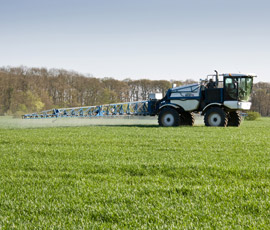Sprayer rules change forces thousands to re-train

Thousands of farmers and sprayer operators born before 1965 will soon be legally required to hold a certificate of competence to spray agrichemicals.
Currently in the UK, anyone born before 31 December 1964 is allowed to use Plant Protection Products (PPPs), authorised for professional use on their own or their employer’s land without an operator’s certificate of competence, although they should be “suitably trained and competent for their job”, according to the Health and Safety Executive (HSE).
However, after 26 November 2015, those who previously relied on “grandfather rights” must hold a Certificate of Competence in the Safe Use of Pesticides.
The announcement by the HSE on Monday (10 June) follows changes to the Plant Protection Products (Sustainable Use) Regulations 2012 aimed at achieving the sustainable use of pesticides by “reducing risks and impacts on human health and the environment”.
In addition, after 26 November 2015, it will be an offence for anyone to purchase PPPs authorised for professional use unless they have ensured that the intended end user has a certificate.
City and Guilds Land Based Services is developing a new Level 2 Award in the “Safe Use of Pesticides, replacing “grandfather rights”.
The HSE said in a statement: “If you were born before 31 December 1964, and will only use pesticides on your own or your employer’s land, you will need to obtain this new qualification.
“Alternatively, you can obtain one of the existing Level 2 Safe Use of Pesticide awards appropriate to the work and type of equipment you use.
“You must take this route if you intend to work as a contractor or apply Plant Protection Products (PPPs) to land you or your employer do not own.”
The new qualification will take account of the fact that people working under “grandfather rights” should already have some form of training and may have many years experience in working with pesticides.
In recognition of this, the qualification has been developed so as to take significantly less time, and cost less, than the existing Level 2 qualifications for pesticide users.
The training will be based on a workbook, setting out the required knowledge, which can be studied at the candidate’s convenience. This will be followed up with a practical assessment of competence.
As with all Level 2 pesticide awards, the training modules will be based on the type of equipment to be used. The assessment should generally be possible at the candidate’s premises, an assessment centre or at an alternative suitable venue.
The proposed release date for the qualification is 26 November 2013. Registration will be available through local City and Guilds NPTC Assessment Centres. Full details will be available on www.nptc.org.uk in due course.
The Voluntary Initiative (VI) will put a set of Frequently Asked Questions on its website shortly.
The NFU has argued that the loss of grandfather rights should be replaced by continuing professional development (CPD) schemes like NRoSO, rather than by forced inclusion on an assessment programme.
Commenting on the rule changes, NFU plant health adviser Don Pendergast said: “This is unlikely to affect big arable units, but there are plenty of sole operators working under grandfather rights and many more on farms with trained staff but who do the occasional bit of spraying.”
He added: “We are looking for a minimum burden on sprayer operators, taking into account people’s experience and knowledge in this area.
“But it’s going to be impacting and people are going to have to take a test. The costs have not been clarified, but we are looking at around £100.”

